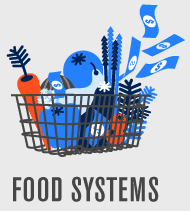In early October the third annual Social Capital Markets Conference (SOCAP) – for investors interested in socially responsible companies – included a special track on food systems. According to the event promoters:
the most promising opportunities and critical areas to make an impact in the short-term are: systemic solutions for healthy ecosystems, regional foods, international trade, biotechnology, and IT.
Odd to see regional food systems in the spotlight with biotech and IT!
 For those who didn’t make it to the conference, almost the complete six session food system track is available online, including audio and PowerPoint presentations.
For those who didn’t make it to the conference, almost the complete six session food system track is available online, including audio and PowerPoint presentations.
- Session 1 – Lay of the Land: Systemic Problems, Creative Solutions:
Topics include the systemic nature of the industry and need to bridge nonprofit & for-profit, private & public, and urban & rural; creative funding mechanisms for sustainable food systems as economic development as well as their transition from funding consumer products to funding food producers themselves; pressing needs and biggest opportunities for a sustainable fish supply; and the evolving role of the government and where they are investing federal funds for reform. - Session 2 – Bare Essentials: Healthy Ecosystems & Ecosystem Services
Topics include the complexities of our water (and irrigation) supply, driven by policy, and investment opportunities for water monitoring, irrigation scheduling, and better allocation & use of water by municipalities; agricultural land conservation and growth, and how to galvanize institutional investors for ag funds; and hot issues and opportunities regarding climate change, carbon and agriculture: emerging environmental markets and preserving ecosystems. - Session 3 – Logistics is Sexy: Regional Food Systems & Infrastructure
Topics include leveraging nonprofits and food bank for aggregation; the need to create branded, value-added goods for producers; and innovative funding strategies for capital-intensive regional distribution hubs that also serve as economic development projects. - Session 4 – Going Global: Building Fair Trade Markets
Topics include the need to increase capital for fair trade producers as well as new platforms that allow consumers to invest in producers and simultaneously increase demand; the benefits of bringing processing closer to origin for agriculture goods and story-telling in product marketing to build awareness and loyalty; collaboration to create a network of regulated, fairly traded, sustainable fisheries in the most prolific, bio-diverse fishing regions; and the need to bring processing closer to fishermen, and how storytelling in seafood does more than just build loyalty; it increases the demand for accurate traceability in an industry rife with inaccurate labeling. - Session 5 – Ag Tech: Bio-Solutions, Precision Agriculture, Traceability & Marketplaces
Topics include the critical need for bio-pesticides and fertilizers to prevent chemical residues and toxic runoff into groundwater and oceans; advances in precision agriculture, which have enormous economic and environmental benefits for both large scale and smaller regional producers re: pesticide/fertilizer application, irrigation, disease control, planting, and harvesting; accurate traceability across vertical and horizontal lines, soon required by law for produce and an essential component for sustainable fisheries; and tools for regional food systems, and how a recent industry supply chain convening shed light on what’s really needed in the short-term. - Session 6 – Creative Financing: Lessons Learned & Strategy Session
- For funders (private and foundation) this session addressed the need to know which of the hundreds of proposals that cross their desk are going to actually work. This session will help you to:
Choose the right parts of the food system to invest in
Identify the right project types and models
Choose the organizations with the capacity to deliver
Find the right collaborators to leverage your investment
Measure success and build metrics to monitor progress
Take full advantage and attend the conference virtually, after the fact, and free!
